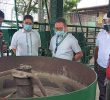DAVAO CITY – Energy developer, Aboitiz Power Corporation’s plan to put up a geothermal power plant in the city may lead to power rate increase, an environment advocate said on Wednesday.
Two months ago, the city council approved Aboitiz Power’s exploratory activities for the geothermal resources.
However, former UP Professor and physicist Kim Gargar believes that “as the industry is getting privatized and profit-oriented, the electricity rate will increase.”
Gargar, who is also the spokesperson for environment group, Panalipdan, believes that the government should not let private corporations to own power companies and must instead “re-nationalize” the electric power industry.
“The first step that the government should work on is to repeal the Epira Law,” Gargar insisted.
The Electric Power Industry Reform Act (Epira) of 2001 was signed by then president Gloria Macapagal-Arroyo. According to IBON Foundation’s research consultant, Arnold Padilla, “Epira provides the legal framework for the privatization of the National Power Corp. and deregulation of the power industry.”
Padilla said “the state-owned power firm used to own and operate generation plants and transmission facilities. It also held supply contracts with independent power producers (IPPs), or private companies allowed by the Power Crisis Act of 1993 (RA 7648) and BOT Law of 1994 (RA 7718) to build and operate generation plants.”
Also, Gargar said that the geothermal power plants can damage key biodiversity areas contrary to claims of Aboitiz Power Corp. that the geothermal plant is safe to the environment and the people.
“Geothermal power plant projects cover vast areas. And with that comes great damage to the environment especially to key biodiversity areas. Our forests will be affected,” he said.
Gargar also hit Aboitiz for “using the threat of rotational brownout as a reason”.
“They are just using the threat of power crisis as an excuse. They are profit-oriented therefore we cannot expect them to provide the public with accessible electricity,” Gargar said.
“The government has money to put up its own energy source. National fund like the pork barrel should be used for this and not to the pockets of politicians,” Gargar said.
Based on the City Council committee on energy report, the project will be located within the Mt. Apo Natural Park located at the tri-boundary of Sta. Cruz, Davao City and Digos City. The project will cover 8,910 hectares.
The Mt. Apo Geothermal Project exploration will be undertaken by Mt. Apo Geothermal Inc. as a subsidiary of Aboitiz Power Corp. According to the report there will be three phases for the project — exploration, construction, and operation of power plant.
The exploration will be two phases – geology and hydrology.
In a press conference Tuesday, Committee Chair for Energy, Councilor Louie John Bonguyan said that the city is exerting efforts to ensure that the city’s power supply will be sustainable to meet the demands.
“Davao City is booming. It is not enough to just settle for coal-fired power plant. The city is consuming electricity, which makes it a basic necessity. As what Energy Secretary Jericho Petilla said, the more power plants, the better,” Bonguyan said.
Aboitiz’ Therma South Incorporated has also put up a 300-megawatt coal-fired power plant in Davao which is expected to be in operation on the first half of 2015.
Aside from Aboitiz Power Corp., Energy Development Corporation (EDC) has also set an eye for the geothermal power plant project.
“Hopefully, by the end of their (exploration) period, we would be able to discover potential sites for geothermal power plant, since it is considered as the least cost, safest and energy efficient among all the electricity resources,” Bonguyan said.
In news reports, Aboitiz said that the geothermal power plant “is safe to the environment and to the health of the people.”
According to Manuel Orig, first vice president for Mindanao Affairs, geothermal power plant will also “result to electricity rates that are comparatively lower than the other rates of other power sources.” (With reports from Sarah Grace Andaya and Ralph Lawrence Llemit, Interns)










